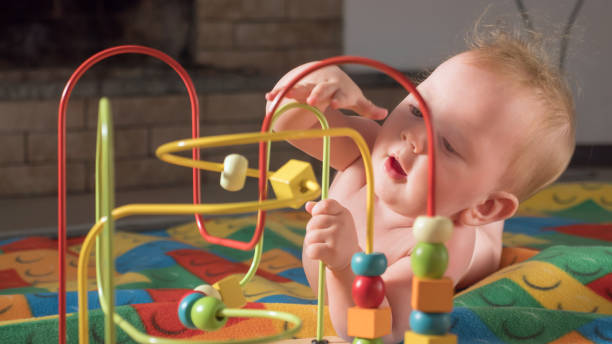Introduction:
Cognitive stimulation refers to activities, experiences, and interactions that engage and challenge a child's thinking abilities, such as perception, memory, attention, problem-solving, and language skills. It involves providing an environment that stimulates a child's cognitive development by exposing them to various stimuli, experiences, and opportunities for learning. Cognitive stimulation aims to support and enhance a child's brain development during the critical early years, when the brain is highly receptive to learning and forming neural connections. By offering age-appropriate activities and engaging interactions, parents and caregivers can help promote intellectual growth, curiosity, and the development of essential cognitive skills
In the early years of a child's life, their brain undergoes remarkable development, setting the foundation for future learning and growth. As a parenting specialist, one of the key areas of focus is cognitive stimulation for babies. Cognitive stimulation refers to activities and experiences that engage a child's thinking, problem-solving, and language skills, fostering their overall cognitive development. Parents play a vital role in providing cognitive stimulation to their little ones, especially during the crucial stage of toddlerhood. However, many mothers face challenges in effectively stimulating their babies' cognitive abilities, whether due to time constraints, lack of knowledge about suitable techniques, limited resources, or the need to balance cognitive stimulation with other aspects of parenting.By understanding the importance of cognitive stimulation and equipping mothers with the necessary knowledge and tools, we can empower them to unlock their babies' development potential and ensure a strong cognitive foundation for lifelong learning. Let's dive into the fascinating world of cognitive stimulation and explore how it can positively impact the growth and well-being of our little ones. This blog aims to shed light on the significance of cognitive stimulation for babies and the problems faced by mothers of toddlers. We will explore the definition and components of cognitive stimulation, the benefits it offers to babies, and the critical period during which cognitive development is most receptive. Additionally, we will delve into the specific challenges that mothers encounter and provide practical insights and strategies to overcome them.
Understanding Cognitive Stimulation
Cognitive stimulation plays a crucial role in the development of babies, particularly during their first few years. As a parent, it is essential to understand what cognitive stimulation entails and how it can benefit your child's overall growth and cognitive abilities.

1.1: Definition and Importance of Cognitive Stimulation
Defining Cognitive Stimulation: Cognitive stimulation refers to activities and experiences that engage a baby's senses, encourage exploration, and promote cognitive development. It involves providing stimulating environments, interactions, and age-appropriate play experiences that support learning and problem-solving skills.
The Significance of Early Cognitive Stimulation: Early experiences have a significant impact on a child's brain development. Research shows that babies who receive consistent cognitive stimulation tend to have enhanced cognitive abilities, language skills, and better academic performance later in life. Providing early cognitive stimulation can also contribute to improved attention, memory, and critical thinking abilities.
Link Between Cognitive Stimulation and Brain Development: Studies have demonstrated that cognitive stimulation leads to increased neuronal connections in a baby's brain, enhancing neural pathways and strengthening cognitive functions. The brain's plasticity during early childhood makes it a crucial period for cognitive development, making the provision of cognitive stimulation particularly valuable during this time.
1.2: Key Components of Cognitive Stimulation
Sensory Stimulation: Engaging a baby's senses through different textures, colors, sounds, and scents can foster cognitive development. Activities such as providing age-appropriate toys, introducing music, and offering varied sensory experiences can promote sensory integration and stimulate brain connections.
Language Development: Language skills are fundamental to cognitive development. Engaging in conversations, reading books, singing songs, and using gestures and facial expressions can enhance a baby's language abilities, vocabulary, and comprehension skills.
Problem-Solving Activities: Promoting problem-solving skills encourages babies to think critically and develop logical reasoning. Providing age-appropriate puzzles, shape sorters, and simple problem-solving tasks can stimulate their cognitive abilities and teach them cause-and-effect relationships.
Creative Play: Encouraging imaginative play allows babies to explore their creativity and develop cognitive skills. Providing open-ended toys, role-playing games, and art activities can stimulate their imagination, improve cognitive flexibility, and enhance problem-solving abilities.
Interactive Learning: Social interaction is vital for cognitive development. Engaging in activities that involve turn-taking, imitation, and joint attention can support a baby's social and emotional development, while also stimulating their cognitive abilities.
Challenges Faced by Mothers of Toddlers
Mothers of toddlers, particularly those aged 1 to 2 years, face various challenges when it comes to providing cognitive stimulation. These challenges can hinder their ability to engage their babies in activities that promote cognitive development. Understanding these challenges and finding strategies to overcome them is essential for creating an enriching environment for babies.

2.1: Time Constraints and Busy Schedules
One of the primary challenges faced by mothers is the limited time they have due to busy schedules and multiple responsibilities. Juggling work, household chores, and other obligations can make it difficult to dedicate sufficient time for cognitive stimulation activities. However, it is crucial to recognize the significance of cognitive development during the early years and make it a priority.
To address this challenge, mothers can incorporate cognitive stimulation into daily routines. For example, during mealtime, they can engage in conversations, describe the food, and encourage the baby to use utensils. Bath time can be turned into an opportunity for sensory exploration by introducing different textures and objects. By integrating cognitive stimulation into existing routines, mothers can make the most of the time they have with their babies.
2.2: Lack of Knowledge about Cognitive Stimulation Techniques
Another challenge faced by mothers is a lack of knowledge about effective cognitive stimulation techniques. Many mothers may not be aware of age-appropriate activities or may hold misconceptions about what stimulates cognitive development. It is crucial to provide mothers with the necessary information and guidance to engage their babies in stimulating experiences.
To overcome this challenge, it is important to educate mothers about cognitive stimulation techniques suitable for their baby's age. This includes providing information about various activities that promote sensory exploration, language development, problem-solving, and creative play. By equipping mothers with knowledge, they can confidently engage their babies in activities that foster cognitive growth.
2.3: Limited Resources for Engaging Activities
Limited resources can also pose a challenge for mothers in providing engaging cognitive stimulation activities. Not all families have access to expensive toys or specialized learning materials. However, it is important to note that stimulating experiences can be created using everyday items found at home.
Mothers can make the most of simple household items such as pots, pans, wooden spoons, and fabric to promote sensory exploration and imaginative play. Singing songs, reading books, and engaging in interactive conversations require no additional resources and can significantly contribute to cognitive development. Additionally, community resources, such as local libraries and community centers, often offer free or low-cost programs and activities that can enhance cognitive stimulation for babies.
2.4: Balancing Cognitive Stimulation with Other Aspects of Parenting
Balancing cognitive stimulation with other aspects of parenting can be challenging for mothers. They may feel overwhelmed with the pressure to provide constant cognitive stimulation while also addressing other needs, such as physical and emotional development.
It is important for mothers to adopt a holistic approach to parenting, recognizing that cognitive stimulation is just one component of overall child development. Allowing time for unstructured play and free exploration is equally important for a child's growth. Mothers should avoid feeling guilty for not constantly engaging their babies in structured activities and understand that a balance between stimulation and downtime is beneficial.
By managing expectations and finding a balance, mothers can create an environment that supports cognitive development while also nurturing other essential aspects of their child's well-being.
Conclusion
In conclusion, cognitive stimulation plays a crucial role in the development of babies, especially during their toddler years. As parents, it is important to understand the significance of cognitive stimulation and actively engage in activities that promote cognitive growth in our little ones.

Throughout this blog, we have explored the definition and importance of cognitive stimulation, highlighting key components such as sensory stimulation, language development, problem-solving activities, creative play, and interactive learning. By incorporating these elements into our interactions with our babies, we can unlock their full potential and set a strong foundation for their future cognitive abilities.

